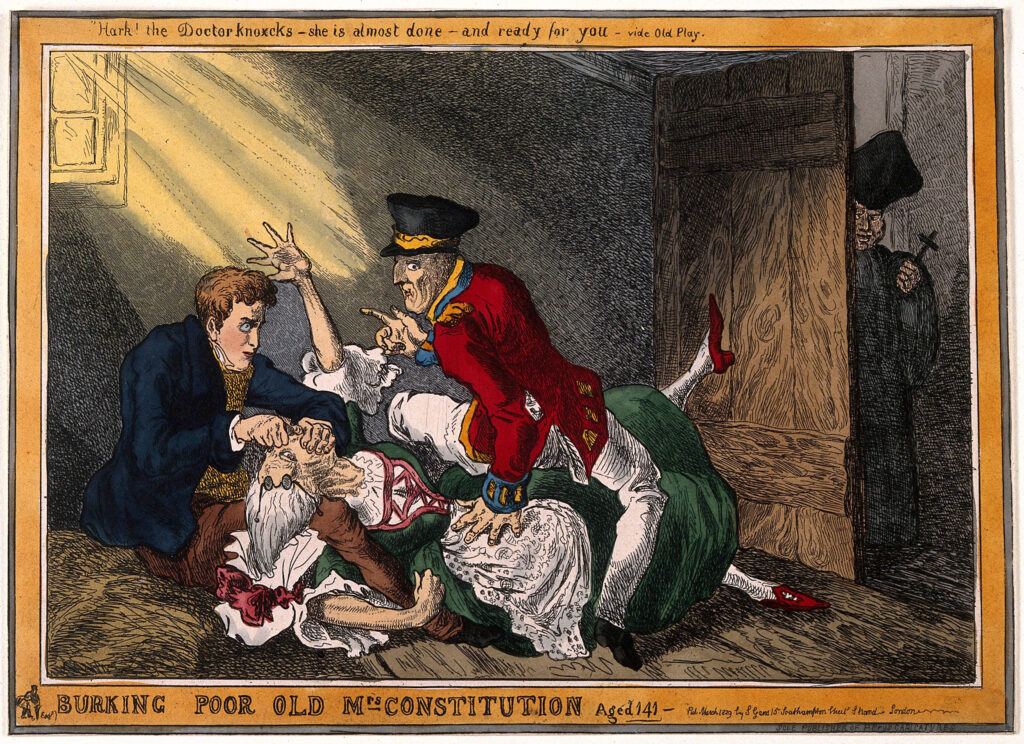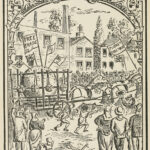5 March 1829: Henry Burton of Hotham tells a rowdy public meeting at Beverley to petition parliament against Catholic emancipation and preserve “the Protestant constitution”

Wellington and Peel in the roles of the body-snatchers Burke and Hare extinguishing the Protestant constitution of 1688 by Catholic emancipation (Heath 1829).
Hull Packet. 1829/03/10. Beverley Anti-Catholic Meeting. Hull. Get it:
.Unedited excerpt
If an excerpt is used in the book, it will be shorter, edited and, where applicable, translated.
Henry Burton, Esq. of Hotham, said, that in coming forward to move a resolution for the adoption of the meeting, he felt that he was performing a duty incumbent on him as one who venerated the laws under which he had the happiness to live; he felt that he was doing his duty as an Englishman, in thus supporting to the utmost of his power that constitution which had been hitherto considered as the pride and glory of this country, while it had been the admiration of every other.-(Cheers.) It was not his intention to occupy their time in repeating the arguments which might be urged against Catholic emancipation: he would leave them to better informed and abler advocates of the cause. A gentleman (Mr. Poulson) who was writing the history of their native town, would tell them what the Catholics had done, even in Beverley. He (Mr. Burton) had duly weighed the arguments and evidences on both sides of the question, and after serious consideration, the conclusion to which he had arrived was, that should further political power be granted to the Roman Catholics, our constitution, which was an essentially Protestant one, would thereby receive a shock which must eventually lead to its complete annihilation.-(Hear.) It was impossible to expect, if Roman Catholics were admitted into the two Houses of Parliament, that they-though upright and conscientious-could legislate with impartiality for Protestants; for, if they did so, they would to be acting in direct opposition to the principles of their religion. He knew it was the fashion of those who differed from him in opinion on this question, to assert that the Roman Catholics of 1829 were very different from what they were in the reign of Queen Mary-that they were now more liberal and enlightened. God forbid that he should deny this; but of what moment was it, while the Roman Catholic religion itself remained the same? Its principles, its doctrines, were the same; its edicts against Protestants were in full force; its intolerance and bigotry were still as great as ever; and the Roman Catholics themselves would proudly tell them that the principles of this religion were unchangeable-eternal. One argument urged in favour of Catholic emancipation was, that it would tranquillize Ireland. So far from tranquillity being the result of that measure, he firmly believed that should the bill pass, fresh disturbances would arise, and that neither Roman Catholics nor Protestants would be satisfied. The result of every bill hitherto passed to benefit the Irish Roman Catholics would bear him out in this assertion; for each had been succeeded by fresh demands; and instead of the much-desired peace and tranquillity, anarchy and confusion, hand in hand, had stalked through that infatuated country.-(Hear.) In his opinion, Ireland must remain in her present condition as long as the mass of her people were kept in a state of superstitious ignorance, and were governed by the tyranny of a wily priesthood. (Cheers.) Emancipation would never satisfy the Roman Catholics-they had far higher objects in view, and would never relax their exertions till they had established the supremacy of their church upon the ruin of our’s, and had regained, step by step, all that our ancestors in their wisdom had deprived them of. His Majesty’s ministers had affirmed of emancipation, that it was a measure of expediency. How was it so? Simply because His Majesty’s ministers were intimidated by six millions of people; they were frightened at the Catholic Association. Were we, therefore, he would ask, to become so intimidated as to offer up the liberties of our country upon the altar of expediency? No; as Protestants we could not, must not, place power in the hands of those who as honest men must use it for our destruction. He would implore, entreat and urge them, by every thing they held most dear, to unite, while there was yet time, and strain every exertion to preserve inviolate the Protestant constitution. (Cheers.) They had received it as an invaluable blessing from their ancestors, and they were bound to hand it down, unimpaired, for the benefit of succeeding generations. Let them come forward and do their duty, and then, whether the numberless petitions, that had been and would be presented to his Majesty and both Houses of Parliament, had the effect of opening the eyes of the legislature, and pointing out the danger which threatened the country, or whether the voice of the people was unheeded, and his Majesty’s ministers blindly pursued their mad career; at all events, (said Mr. B.) we shall have the consolation of being among those who in the hour of peril came forward, and unawed by the taunts and sarcasms of the self-styled liberals of the day, boldly declared our unalterable attachment to the Protestant constitution of this country. The resolution he had to move was-“That at the present important crisis of affairs, it is essentially necessary to address the Throne, and to petition both Houses of Parliament against any further concessions of political power to the Roman Catholics of the united kingdom.”
Comment
Comment
Something to say? Get in touch
Similar
 23 December 1689: A Danish soldier is beheaded at Beverley for killing a comrade in a duel, inspiring some doggerel
23 December 1689: A Danish soldier is beheaded at Beverley for killing a comrade in a duel, inspiring some doggerel 15 October 1838: Apologies from “imprisoned” Huddersfield workers are read to the great Chartist rally on Peep Green (Hartshead Moor), accusing middle-class radicals of betrayal
15 October 1838: Apologies from “imprisoned” Huddersfield workers are read to the great Chartist rally on Peep Green (Hartshead Moor), accusing middle-class radicals of betrayal 12 December 1641: John Sugden causes panic in Bradford and Pudsey with news of the imminent advent of genocidal Irish Catholics
12 December 1641: John Sugden causes panic in Bradford and Pudsey with news of the imminent advent of genocidal Irish Catholics
Comment
Comment
This is a Jesuit hagiography, and I don’t know to what extent the source reflects the substance of Dolben’s remarks. Wikipedia takes a more benevolent view of him:
In the aftermath of the Popish Plot, Dolben tried many of the accused, including Sir Thomas Gascoigne, 2nd Baronet and Sir Miles Stapleton; due to his impartial trait of pointing out inconsistencies in the prosecution’s evidence, both were acquitted.[4] At the trial of Mary Pressicks, who was accused of saying that “We shall never be at peace until we are all of the Roman Catholic religion”, Dolben saved her life by ruling that the words, even if she did speak them, could not amount to treason.[5] As a result of this and his opposition to Charles II’s removal of the City Corporation’s writs, he was “according to the vicious practise of the time” dismissed on 18 April 1683. Again working as a barrister, Dolben prosecuted Algernon Sidney in November 1683 before being reinstated as a Justice of the King’s Bench on 18 March 1689. Records from 29 April show him “inveighing mightily against the corruption of juries [during the Glorious Revolution]”,[1] and he continued sitting as a Justice until his death from an apoplectic fit on 25 January 1694,[6] and was buried in Temple Church.
Vulgar almanacs glory in death sentences and executions, but I suppose one (1) is called for.
Something to say? Get in touch
Search
Donate
Music & books
Place-People-Play: Childcare (and the Kazookestra) on the Headingley/Weetwood borders next to Meanwood Park.
Music from and about Yorkshire by Leeds's Singing Organ-Grinder.



 Bluesky
Bluesky Extwitter
Extwitter